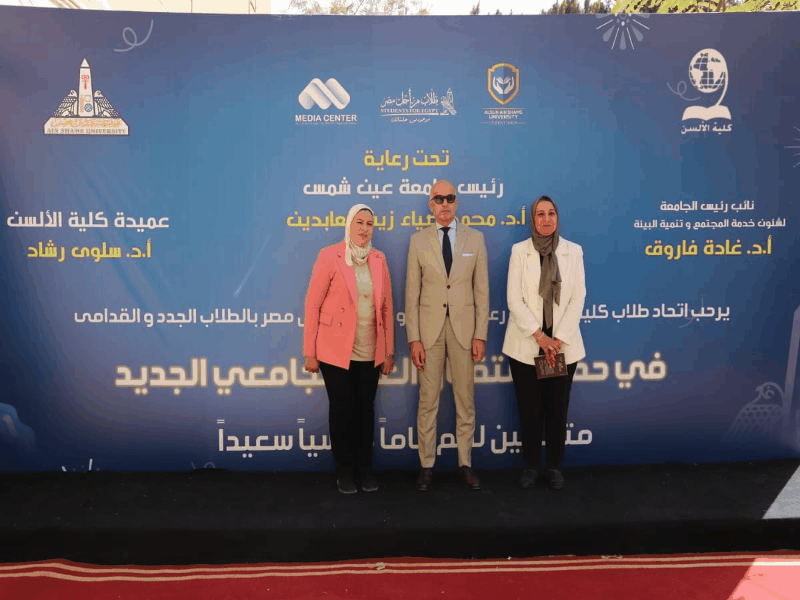The President of Ain Shams University inaugurates the reception ceremony for new and old students for the academic year 2024/2025 at the Faculty of Al-Alsun
Prof. Mohamed Diaa Zain El Abedeen, President of Ain Shams University, inaugurated the welcoming ceremony for new and returning students for the 2024/2025 academic year at the Faculty of Al-Alsun. The event was attended by Prof. Ghada Farouk, Vice President for Community Service and Environmental Development, Prof. Saleh Hashem, former President of the University and former President of the Association of Arab Universities, Prof. Salwa Rashad, Dean of the Faculty, Prof. Ashraf Atiya, Vice Dean for Graduate Studies and Research, and Prof. Youmna Safwat, Vice Dean for Community Service and Environmental Development. Speeches were also given by Prof. Rana El-Helaly, Director of the University's Center for Students with Disabilities, Prof. Sherweit El-Ahmady, Director of the International Students and Mobility Office, Prof. Hend El-Helaly, Director of the Women's Support and Anti-Violence Unit, and student Ali Wang Wei, representing non-Arabic speaking students.
In his opening speech, Prof. Mohamed Diaa emphasized that the Faculty of Al-Alsun at Ain Shams University is one of the oldest language institutions in the Middle East, having been founded during Egypt's modern renaissance by Mohamed Ali. The Faculty reflects Egypt's history and has, over the decades, continued to teach the languages and cultures of various nations on Egyptian soil. He noted that the value of the Faculty of Al-Alsun stems from this role, as it has played a significant enlightening role throughout its history.
He further highlighted the faculty’s pioneering role in establishing distinguished departments such as the Chinese and German language departments, which are among the oldest in Egyptian universities. This has contributed to the faculty's prestigious position both locally and internationally.
Prof. Zain El Abedeen also commended the efforts of the previous university administration, led by Prof. Mahmoud El-Meteini, for their contributions to the university's faculties. He emphasized that institutional work is a hallmark of Ain Shams University, where each administration builds on the successes of the past to continue the journey of excellence, maximize benefits, and develop a modern educational system capable of competing with major global universities.
In her opening remarks, Prof. Salwa Rashad, Dean of the Faculty, described the Faculty of Al-Alsun as a "garden of knowledge" and a "bridge of culture," founded during Egypt's renaissance by the pioneer of enlightenment, Rifa’a al-Tahtawi, in 1835. She noted that over the years, the faculty has strived to keep pace with progress and development in line with the vision of the faculty, the university, and the Egyptian state.
She highlighted several measures taken by the faculty, including the development of its programs to meet labor market needs. This includes the establishment of eight new undergraduate programs in translation, simultaneous interpretation, and specialized translation, enriching the knowledge exchange between Arabic and foreign languages in fields such as media, commerce, and economics.
Additionally, the faculty has introduced advanced postgraduate programs in written and simultaneous translation, as well as translation technology, to train translators in using the latest software for managing translation projects, multimedia translation, and localization with high efficiency and quality.
The faculty has also focused on improving its infrastructure to support educational programs by upgrading and maintaining classrooms, simultaneous interpretation labs, and audio labs. In response to the COVID-19 pandemic, the faculty enhanced its electronic program systems by uploading all courses to the university’s UMS platform, applying the hybrid education system, which has been in place for the past five years in accordance with ministerial decisions.
In terms of international cooperation, the faculty has signed several agreements and memorandums of understanding to exchange professors, students, and joint programs with universities around the world. These include collaborations with Leipzig University in Germany, the University of Salamanca in Spain, the University of Porto and the Camões Institute in Portugal, Tsukuba, Tokyo, and Hiroshima universities in Japan, Hankuk University in South Korea, Beijing University, the University of International Business and Economics, and Shanghai University in China, the University of Kent in the United States, and Charles University in the Czech Republic.
To prepare students for the job market, the faculty has provided internships and established cooperation protocols with various governmental and non-governmental training and employment organizations. These include internships at the National Center for Translation, the State Information Service, and translation training in collaboration with the United Nations.
Through its Alumni and Professional Training Unit, in collaboration with the Alumni Association and the University’s Employment Center, the faculty focuses on supporting its graduates, preparing them for the labor market, and guiding them toward job opportunities. This is achieved through employment fairs and databases created by companies and employers.
The ceremony included a musical performance by the faculty choir, which won first place at the university level. Prof. Mohamed Diaa Zain El Abedeen also toured the faculty's campus to explore the student activities offered by the faculty, including cultural and artistic exhibitions, handicrafts, and sports activities such as chess, table tennis, and various other sports. The event was held for the first time in the new landscape of the faculty, following its inauguration at the faculty's outdoor theater.a


.svg)

